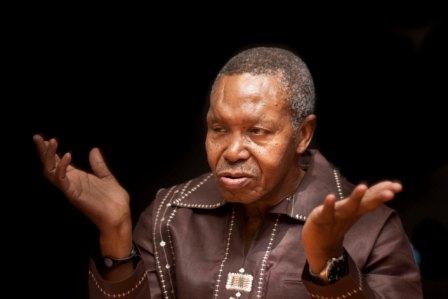
Characteristically modest, Joe Thloloe used the opening of his speech on Saturday Graduation ceremony for the faculty of Commerce to praise the journalists and staff of the School of Journalism, with special plaudits reserved for Guy Berger, whom he saluted for his incredible leadership and his contribution to African and world journalism.
Were he able to reply from his place among the assembled academics, Guy Berger would more than likely have said exactly the same thing about Thloloe, current Press Ombudsman, journalist of fifty years standing and a veteran of the struggle against apartheid.
Thloloe then thanked his family and his friends who were in the audience to witness his receiving of an Honorary Doctorate, and, as he so evocatively put it, “to be witnesses on behalf of the thousands of people that I can see in my mind’s eye, people applauding their handiwork, people who shaped who I am today.”
Among this unseen throng, he specifically named his mother and his late father, his school teachers, and some of the exceptional journalists who imparted their knowledge to him. Additionally, he mentioned those who contributed unintentionally to the man he is today. “...people like the security policemen who tortured me in lonely offices haunted by screams when I was detained under Section 6 of the Terrorism Act or under the Internal Security Act.”
Thloloe was present, as a teenager, at the protests in Sharpeville in 1960. Arrested along with many others at the Orlando Police Station on March 21, the full horror of the massacre which occurred later that day did not come home to him until they read the next day's newspapers. Shortly thereafter he joined the newspaper Bantu World, where, he says, his eyes were opened to the reality of journalism under apartheid.
Thloloe paused briefly here to remind the audience that the cowardice of many journalists and the exceptional courage of hundreds of others during those years are already on record. He then moved us forward in time to 27 April 1994, and, two years later, to the 1996 constitution, with its guarantee of freedom of expression and freedom of the press and other media. This, says Thloloe, was vindication, and the real victory.
The Honorary Doctorate from Rhodes University comes exactly fifty years after Thloloe started as a journalist. It also, he reminded the audience, comes at a time when Press self-regulation in South Africa has come under intense scrutiny. The freedoms guaranteed in the Constitution are, he says, held in trust for everyone, meaning that the decision about what to publish rests squarely on the shoulders of the journalists.
“As soon as that decision is located in an external agency, like a statutory Media Appeals Tribunal, the right guaranteed by the constitution of the country is curtailed...some people will swear that they believe in freedom of expression but in the same breath they will shout that we should jail errant journalists and ban them and their publications. This tells me that our democracy is only skin-deep as we regress easily to what the Nationalist Party represented.”
Thloloe points out that around 700 publications have, voluntarily, adopted the South African Press Code, “to promote and to develop excellence in journalistic practice and ethics”. The code defines good journalism as “truthful, accurate, and fair, in context, balanced and not intentionally or negligently departing from the facts by distortion, exaggeration, misrepresentation, or material omissions.”
As Press Ombudsman, Thloloe received 213 complaints last year. While feeling that even one complaint is too many, he had to, he says, concede that out of all the millions of words churned out by journalists every day, it is a drop in the ocean. By and large, journalists are living up to the promise in the Press Code “to serve society by informing citizens and enabling them to make informed judgments on the issues of the time.” Be vigilant, he urges, and make sure that our freedoms are guarded and respected.
Full speech click here
Citation click here
By Jean McKeowin
Photo by Sophie Smith
